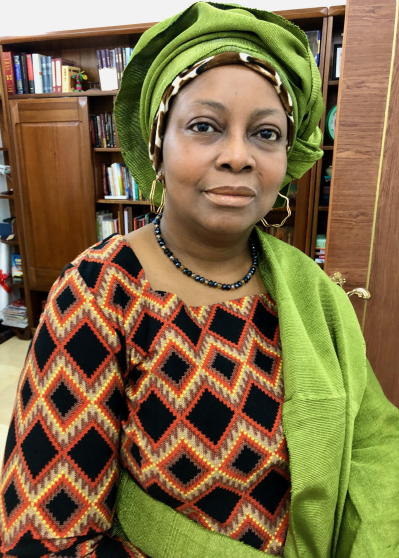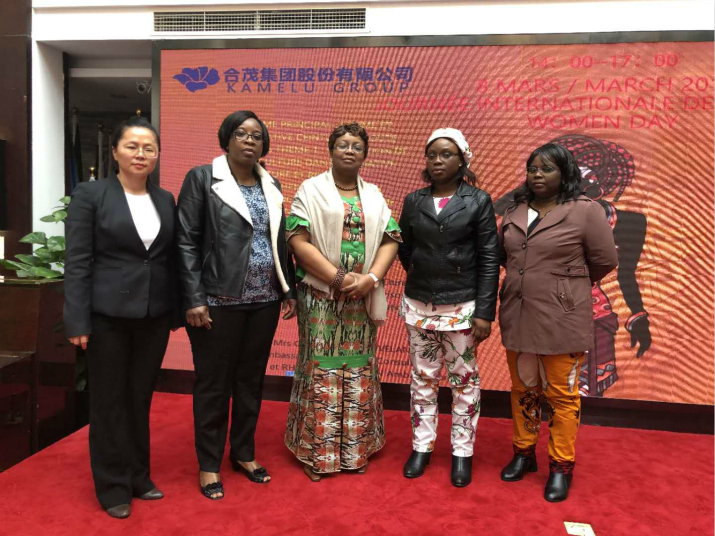|
||||||||||
| Home Nation World Business Opinion Lifestyle ChinAfrica Multimedia Columnists Documents Special Reports |
|
||||||||||
| Home Nation World Business Opinion Lifestyle ChinAfrica Multimedia Columnists Documents Special Reports |
| ChinAfrica |
| Expanding Space |
| Women in Africa are assuming greater responsibilities both within and outside the family |
| ChinAfrica | VOL.12 March ·2020-02-26 |

Christiane Bokpe Adovelande (COURTESY PHOTO)
The African continent has recorded a relatively high growth rate over the past decade. But, although the contribution of women to this growth is well established, studies show that gender inequalities are still serious. Minority has gradually stepped into the limelight.
On the eve of the International Women's Day 2020, ChinAfrica had an interview with Christiane Bokpe Adovelande, wife of Beninese Ambassador to China, who talked about the past struggles and achievements, as well as what the future holds for women in Africa. Holder of a Master's Degree in gender, peace and security, Adovelande is now working as a freelance consultant in management and gender. Below are edited excerpts of the interview.
ChinAfrica: You are deeply involved in the reflection on women's issues. Could you tell us more about this commitment?
Christiane Bokpe Adovelande: The moment I realized we live in a world where men tend to make decisions at all levels - national, professional or family - without taking into account the interests of women, I felt the need to act as much as I can to make a change. This is what drives me to get involved in women's circles wherever I am.
I believe in the inner strength of women as well as their ability to bring about positive transformations in all spheres of development in society. And this potential is even more positive when women manage to come together for noble goals because there is a kind of synergy that arises from their desire to bring a change.
However, I am not a feminist because I believe the debate to reduce inequalities requires dialogue and negotiation. Extremism or the use of force cannot work.
We cannot simply demand equality: we must work for it and make sure the states no longer have women in various governing bodies merely because of affirmative action, but based upon their merit.
What role do you think women play in economic and social development in Africa?
When a woman is educated, it has a very positive impact on her children because she is able to help them in their studies and activities. She is also able to better manage the health and nutrition of the family.
Outside their households, women in public life contribute in several ways to the socio-economic development of their countries. In rural areas, many African women work in the fields the same way as men and thus participate in increasing agricultural production. And they are the ones who go to the markets to sell fresh produce and generate additional income.
Women with education work in both the public and private sectors, and are increasingly entering sectors that were once reserved for men, such as engineering and technology. In Benin, I see that more and more women are starting entrepreneurial ventures with great success, which is a sign of their desire to be financially independent. Having a career is factor behind the liberation of women. It is indisputable.

Christiane Bokpe Adovelande (middle) with diplomats from the Beninese Embassy to China and an interpreter at an event to celebrate the International Women's Day in Beijing on March 8, 2019 (COURTESY PHOTO)
What is the role of women in Africa in peace and security?
Unfortunately, Africa has experienced many internal conflicts. And women are the first victims because they find themselves alone after the men have left for the front line. They have to defend their families, sometimes at the cost of their lives. The most devastating impact of conflicts on women, however, remains sexual violence and abuse of all kinds, as combatants often use sexual abuse as a weapon of war.
This is the reason why, over time, women have become very much involved in peace negotiations, in peaceful settlement of disputes or disarmament procedures. They use their social influence to play the role of mediators between the belligerents. They even participate in the processes of economic reconstruction of their countries after the war. Women's peace coalitions have greatly influenced the outcome of peace agreements in several conflicts that have rocked our continent.
Regarding the progress made on gender equality and empowerment of women on the continent, do you foresee any challenges ahead?
African women are active participants and creative in all sectors. Unfortunately, men and women do not always enjoy the same economic, professional and social conditions or opportunities. In the agricultural sector, women make up almost 70 percent of the working population but very few of them actually own land. In public administration, with equal performance and competence, women are paid much less than men. In the commercial field, more than half of the active women remain in the informal sector and still cannot start a business or open a bank account. In scientific research, the presence of women is 30 percent lower than that found in most countries.
However, it should be noted that many African countries have made notable progress in facilitating access to credit, health and education for women, and the latter sector is, moreover, the one where the most significant progress has been made. It should also be noted that African women are increasingly encouraged to seek executive positions, whether at government level or in national parliaments.
In Benin, for instance, school education has been free for girls for over 10 years, and women no longer have to bear the cost of cesareans in public hospitals for four years already. The all-new constitution of November 1, 2019 gives women greater access to political office and positions in the country's governing institutions.
In fact, the main obstacle to the emancipation and empowerment of African women lies in beliefs and customs, which sometimes equate them with "slaves of marriage," governed by family and ethnic traditions. In addition to this cultural factor, economic factors such as poverty and illiteracy must also be taken into account.
There needs to be real awareness at the highest level: the advancement of women in all sectors is a powerful lever for the development of African economies.
China is currently facing a serious coronavirus outbreak. What do you think of the measures taken by the Chinese Government?
First, I would like to express all my compassion, as well as that of the Embassy of Benin and the Beninese community in China, to the Chinese nation which is struck by this epidemic when the Chinese Lunar New Year celebrations were about to start. We are saddened by the deaths, but we are glad to see an increasing number of recoveries.
I must say that we are struck by the responsiveness of the Chinese Government and the effectiveness of the measures that have been put in place, particularly in Wuhan, to limit the spread of the coronavirus. These energetic measures are very reassuring for the diplomatic corps in China and we congratulate the Chinese Government for the responsible way it handled the situation.
This is the reason why we indicated to our students and the whole Beninese community in China, that it was not necessary, at this very moment, to panic or to be repatriated, but rather to respect the protection instructions which are given.
We are convinced that China will emerge from this epidemic very soon.
To all the Chinese people, we say: Good luck! Zhongguo, Jiayou!
(Comments to lixiaoyu@chinafrica.cn)
| About Us | Contact Us | Advertise with Us | Subscribe |
| Copyright Beijing Review All rights reserved 京ICP备08005356号-5 京公网安备110102005860号 |